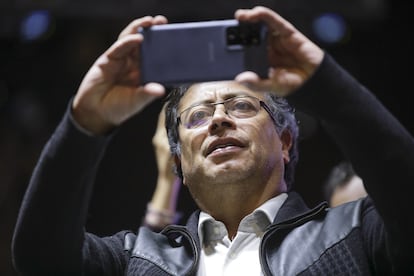Twitter diplomacy undermines Petro’s foreign policy
The Colombian president’s tweets and his Foreign Minister’s issues jeopardize the most positive aspect of his administration


Looking back at the first 100 days of Gustavo Petro’s administration, it’s remarkable how they efficiently tackled longstanding issues, including the tax reform that had undermined public support for the previous administration and restored diplomatic relations with Venezuela. Colombia was feeling good about itself and people were coming together. But then it all started to unravel. Petro has seen a steady decline in his job approval ratings since assuming office nearly 18 months ago. His “Government of Change” has dropped dramatically in public opinion polls, reflecting a national sense of pessimism. The latest Invamer bimonthly poll in Colombia reveals that 66% disapprove of Petro’s performance, with only 26% approving. An alarming 57% of Colombians believe that international relations are deteriorating, marking the second-worst poll numbers in the 30-year history of these surveys. Former president Iván Duque, who severed ties with Venezuela in 2019, holds the distinction of having the worst foreign policy ratings.
Petro had two things going for him when he took office. Most Colombians were excited about the prospect of change and supported Petro’s first moves as president. And he quickly gained recognition abroad, establishing himself as a new, progressive regional leader. Some notable accomplishments included his stance on combating climate change, his push for a global anti-drug policy, his pursuit of domestic peace, and his ability to get the international community to rethink their attitudes toward Venezuela. But everything seemed to revolve around Petro the man, and the honeymoon excitement faded quickly. Petro began articulating his policies — including Colombia’s foreign policy — in a series of wildly erratic tweets.
Political analyst Yolanda Ruiz finds the current foreign policy to be the prime example of Petro’s paradoxical governance approach, especially in light of his many state visits and efforts to become a regional leader. “Many of his international proposals are appropriate and align nicely with the rest of the world,” said Ruiz. “However, the president’s confrontational style leads to poor communication. His diplomacy lacks diplomacy.” Laura Lizarazo, a political analyst with Control Risks, agrees: “He’s really visceral, which makes it feel like he manages foreign policy by the seat of his pants. It doesn’t seem like an institutional approach.”
Despite some well-received international speeches, Petro’s frequently offensive tweets have undermined the institutional image of a government long known for its pragmatism, diligence and diplomacy. In September 2022, when Chileans voted down a new Constitution, Petro tweeted “Pinochet lives!” even before President Gabriel Boric had a chance to comment on the results of the plebiscite. Petro has also tussled with El Salvador’s controversial President Nayib Bukele in some acrimonious social media sparring. After Javier Milei won Argentina’s presidential election, Petro’s first tweet said, “The extreme right has won in Argentina. That’s the decision of your society. Sad for Latin America, as we’ll soon see…” In February, Peru declared Petro persona non grata for tweeting that its police officers “march like Nazis against their own people” during public demonstrations. And he faced widespread criticism for not condemning the Hamas attack on Israel.
According to former defense minister Gabriel Silva, many Colombians fear that Petro and Foreign Minister Álvaro Leyva could lead the country to international isolation and even repudiation. Silva believes that Colombia has long felt like a “pariah country” due to its history of drug trafficking and violence. “Colombians have faced significant discrimination towards their country, which has gradually diminished through diligent efforts to improve our image,” said Silva. Europe recently waived visa requirements for Colombians, and there has been a positive shift in the relationship with the United States. Consequently, many Colombians are concerned about the president’s “ideological and confrontational approach” towards the U.S. and Israel regarding the war in Gaza. At home, Petro is perceived as being soft on crime and his “total peace” plan is having trouble getting off the ground.
Foreign Minister Álvaro Leyva’s problems have also detracted from Colombia’s foreign policy. The 81-year-old Leyva has held various portfolios under different presidencies, and his experience in mediation has led him to participate in almost every administration as an advisor in peace talks since 1982. But he has few accomplishments to his credit as foreign minister. “Petro has made significant announcements, including Colombia’s return to UNASUR [the South American Union], the establishment of a NATO-like organization for the Amazon region, and the expansion of CAN [Andean Community]. However, there seems to be a lack of support from the Foreign Ministry, which makes one wonder whether Leyva is right for a left-wing government like this,” said Mauricio Jaramillo, a professor of international relations at the University of the Rosary (Colombia).
Despite all the controversy surrounding Leyva, the president has consistently supported him. Yet Petro has shown no hesitation in parting ways with other collaborators — only seven of the 18 ministers he appointed six months ago remain, including Leyva. Laura Lizarazo acknowledges Leyva’s expertise in government and peace negotiations, but notes a glaring lack of interest in other critical aspects of foreign policy. “He is completely unaware of the players and their objectives, and shows little interest in effectively addressing the wide range of important issues that require strategic leadership.”
The idea of a broad progressive axis in Latin America represented by Petro, Boric and Lula da Silva in Brazil, is in danger of fading due to the lack of progress in Chile and Colombia. Their plummeting job approval ratings, along with the rising tide of Bukele in El Salvador and Milei in Argentina, have dimmed hopes of a more democratic region. Foreign wars and the ongoing crisis in Venezuela detract even more attention from Petro’s message, which is not helped by his social media blunders. Colombia’s foreign policy now appears to be a pressing domestic issue.
Sign up for our weekly newsletter to get more English-language news coverage from EL PAÍS USA Edition
Tu suscripción se está usando en otro dispositivo
¿Quieres añadir otro usuario a tu suscripción?
Si continúas leyendo en este dispositivo, no se podrá leer en el otro.
FlechaTu suscripción se está usando en otro dispositivo y solo puedes acceder a EL PAÍS desde un dispositivo a la vez.
Si quieres compartir tu cuenta, cambia tu suscripción a la modalidad Premium, así podrás añadir otro usuario. Cada uno accederá con su propia cuenta de email, lo que os permitirá personalizar vuestra experiencia en EL PAÍS.
¿Tienes una suscripción de empresa? Accede aquí para contratar más cuentas.
En el caso de no saber quién está usando tu cuenta, te recomendamos cambiar tu contraseña aquí.
Si decides continuar compartiendo tu cuenta, este mensaje se mostrará en tu dispositivo y en el de la otra persona que está usando tu cuenta de forma indefinida, afectando a tu experiencia de lectura. Puedes consultar aquí los términos y condiciones de la suscripción digital.








































